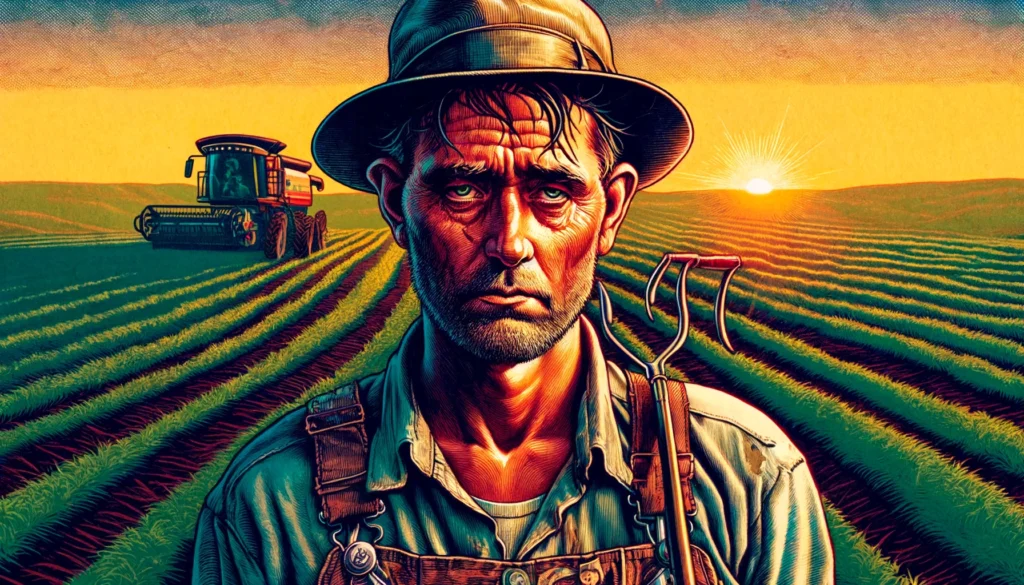
FarmerCowboy.com Photo Illustrate a vivid and detailed image of a worn out farmer embodying the phrase rode hard and hung up wet. The farmer is an agriculturalist agricu2.webp.webp
The “Root Word” of the Matter
At the heart of this agricultural agitation is a simple desire for recognition. “When someone calls me an ‘agronomist,’ it feels like they’re overlooking the very essence of what I do,” shared Hank Johnson, a local farmer with over three decades in the fields. “I don’t sit in a lab all day; I’m out here, rain or shine, cultivating the land.” Adding a twist of humor, Hank noted, “If I wanted a title that fancy, I would have bought a thesaurus, not a tractor!” The confusion has even led to a comical mix-up at a local conference where Hank was mistakenly asked to give a lecture on soil biochemistry, a subject he claims to know less about than “the mating habits of Martian worms.”
The English word agriculture derives from the Latin ager (field) and colo (cultivate) signifying, when combined, the Latin agricultura: field or land tillage, —David R. Harris & Dorian Q. Fuller
What are Farmers Saying These Days to Us Nosy Reporters?
- Identity Crisis: “Call me an agronomist one more time, and the next crop I’ll be planting is a fist tree, and you’re getting the first harvest!” It’s not just about the title; it’s about respect. Farmers are the backbone of our food supply, not just scientists in the field. They have a connection to the land that goes beyond soil samples and crop yields. It’s an art, a tradition, and a way of life. When you reduce their role to a single term, you’re not just mislabeling them; you’re overlooking the sweat, the dedication, and the passion that goes into every harvested field.
-

Farmer, Agriculturalist, Agricultural scientist, Agrologist, or Agronomist… (2) Title Tussle: “I’m a farmer, not an ‘agronomist.’ I grow corn, not confusion!” To the untrained ear, ‘agronomist’ might sound sophisticated, but to the farmer, it’s just another way of saying, ‘I don’t understand what you do.’ Farmers don’t just study plants; they nurture them, battle the elements, and feed nations. When you call a farmer an agronomist, you’re not giving them a compliment; you’re giving them a headache.
- Label Rebellion: “Say ‘agrologist’ one more time, and I’ll personally enroll you in a crash course in ‘Tractor Dodging 101’ out in the field!” Farmers do have a well-tuned sense of humor, but it’s not all fun and games when you’re knee-deep in the soil. They’re not your average lab coat-wearing scientists; they’re the rock stars of the rural scene, the virtuosos of the verdant. These are the folks who can read the sky like a morning newspaper and speak ‘plant’ as a second language. They deserve a title that’s as grounded and gritty as they are—and preferably one that doesn’t sound like they’re about to give a lecture on photosynthesis.
- Pride and Produce: “I prefer ‘crop artist’ to ‘agricultural scientist.’ The only test tubes I use are for milking cows!” There’s an art to farming that goes unnoticed when you slap a scientific label on it. It’s in the way a farmer knows just by the feel of the soil or the look of the sky what the day will bring. It’s a dance with nature, not a laboratory experiment.
- Semantic Scuffle: “Call me an ‘agriculturalist’ again, and I’ll show you some ‘aggressive-culturist’ behavior!” It’s about pride. Farming is a noble profession, steeped in history and tradition. When you call a farmer an agriculturalist, you’re not just misnaming their job; you’re ignoring their heritage, their identity, and their connection to generations of farmers who came before them.
-

Farmer, Agriculturalist, Agricultural scientist, Agrologist, or Agronomist… (5) Word War: “If I hear ‘agronomist’ one more time, I’ll start introducing myself as an ‘annoyed-omist’!” This playful threat underscores a deeper frustration with being boxed into a technical term that fails to capture the breadth and depth of farming. It’s not just about the science; it’s about the early mornings, the late nights, and the intuitive understanding of the land that can’t be learned from books.
- Terminology Takedown: “I didn’t need a degree to learn how to throw hands. Keep calling me an ‘agronomist’ and you’ll learn that too.” This jest highlights the gap between academic learning and the hands-on, experiential knowledge that defines farming. It’s a reminder that while terms like agronomist are born in classrooms, the true essence of farming is learned in the fields.
- Nomenclature Nuance: “I’m a farmer, which means I deal in dirt, not ‘agrologist’ diplomas!” This quip underscores the practical, down-to-earth nature of farming, contrasting the real, tangible work of farming with the abstract, often theoretical world of academic titles.
- Expertise Exasperation: “Sure, call me an ‘agricultural scientist.’ I’ll call you a ‘human annoyance engineer.’” This response reflects the farmer’s exasperation with being pigeonholed by academic labels. It’s a witty reversal that challenges the appropriator to consider how they’d feel if their identity were reduced to a sterile, impersonal title.
- Title Tantrum: “‘Agrologist’? The only ‘agro’ I know is the one I get when people don’t call me a farmer!” This clever play on words captures the farmer’s frustration, turning the academic term on its head to express their irritation with the mislabeling.
- Agronomy Aggravation: “Seems like the only thing growing faster than my crops is my list of ‘fancy’ titles I don’t want.” This observation wittily juxtaposes the growth of crops, the farmer’s pride, with the proliferation of unsolicited, fancy titles, highlighting the disconnect between the farmer’s self-perception and the labels others impose.
- Definition Dilemma: “Every time someone calls me an ‘agronomist,’ my tractor mysteriously ‘forgets’ how to plow their field.” This humorous threat illustrates the farmer’s deep connection with their tools and land, suggesting a mystical bond that transcends mere technical expertise.
- Pseudonym Problem: “An ‘agriculturalist’? Is that like a dentist for corn? Because I’m just a plain old farmer.” This playful analogy underscores the absurdity of the term ‘agriculturalist’ by comparing it to an equally absurd, fictional profession, highlighting the disconnect between the label and the reality of farming.
- Moniker Mayhem: “I thought ‘agrologist’ was what you called a particularly angry geologist. I’m just here to farm!” This witty remark plays on the confusion that these technical terms can create, using humor to underscore the farmer’s preference for simplicity and clarity in how their profession is described.
- Alias Annoyance: “Sure, I’m an ‘agricultural scientist’—I experiment with how much nonsense I can tolerate before breakfast.” This quip reflects the farmer’s daily reality, grounded in practical challenges and hard work, contrasting it with the perceived aloofness of scientific titles. It’s a light-hearted way to assert the dignity and groundedness of the farming profession amidst a sea of complicated labels.

Terminology Turmoil
The array of titles thrust upon these agricultural artisans ranges from “agrologist” to “agricultural scientist,” terms that many argue add unnecessary complexity to their profession. “I know more about crop rotations than I do about fancy titles,” stated Sarah Miller, another farmer at the forefront of the movement for nominal clarity. She humorously recounted an incident where a visiting dignitary referred to her as an “agricultural scientist,” to which she replied, “I’m so good at science that I convinced my tomatoes they’re apples.” The farmers’ quest for title simplicity is backed by a recent study showing that 7 out of 10 people couldn’t differentiate an agronomist from an astrologist, leading to some very confused horoscope readings.
Agronomist: Community Consensus

A recent survey conducted among the local farming community revealed a staggering 95% prefer the straightforward title of “farmer.” “It’s not just a job; it’s an identity,” explained Miller, echoing the sentiments of her peers. She quipped, “If you call me an ‘agrologist’ again, I might just start believing my tractor is a spaceship.” The overwhelming preference for the term “farmer” reflects a deep-rooted pride in their profession, with many emphasizing that the only “ist” they’re comfortable with is “optimist”—optimistic that their crops will grow and that their title will be understood.
Agrologist: Expert Insight
Dr. Julia Green, an anthropologist specializing in occupational identities, weighs in: “When you strip away the titles, you’re left with the core of what these individuals contribute to society—they cultivate our food, manage our landscapes, and preserve our natural resources. The title ‘farmer’ encapsulates all that and more.” She humorously added, “Plus, ‘farmer’ is much easier to fit on a business card than ‘agricultural environmental biotechnological specialist’.” Green’s research indicates that the clarity of the term “farmer” not only aids in public understanding but also boosts the farmers’ sense of identity, proving that sometimes, simpler is indeed better.
Agriculturalist: The Way Forward
In response to the growing discontent, several agricultural organizations are advocating for a return to the basics, urging institutions, media, and the public to embrace the term “farmer” with the respect and recognition it deserves. One farmer, Joe Barnes, expressed his vision humorously: “I dream of a world where I can say ‘I’m a farmer’ and not be handed a lab coat.” The movement has gained such momentum that there’s talk of hosting a “Name It Right” rally, where farmers will showcase their work, not through presentations or lectures, but by inviting attendees to experience a day in the life of a true farmer—muddy boots and all.
Originally posted 2020-03-30 16:09:29.
Originally Published at FarmerCowboy.com
2024-12-06 02:54:28
Karl Hoffman is a distinguished agriculturalist with over four decades of experience in sustainable farming practices. He holds a Ph.D. in Agronomy from Cornell University and has made significant contributions as a professor at Iowa State University. Hoffman’s groundbreaking research on integrated pest management and soil health has revolutionized modern agriculture. As a respected farm journalist, his column “Field Notes with Karl Hoffman” and his blog “The Modern Farmer” provide insightful, practical advice to a global audience. Hoffman’s work with the USDA and the United Nations FAO has enhanced food security worldwide. His awards include the USDA’s Distinguished Service Award and the World Food Prize, reflecting his profound impact on agriculture and sustainability.
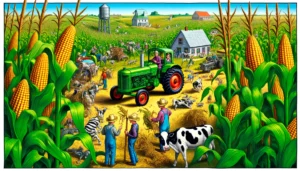
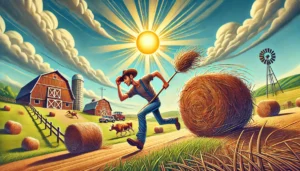

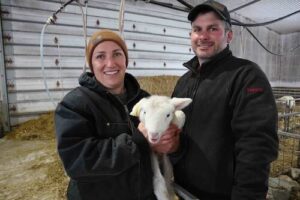


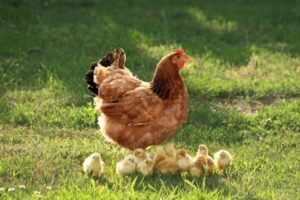
Negativity might be loud, but Farm.FM plays louder. Turn up the tunes and drown out the trolls!
Too funny! I’m sharing this! ??